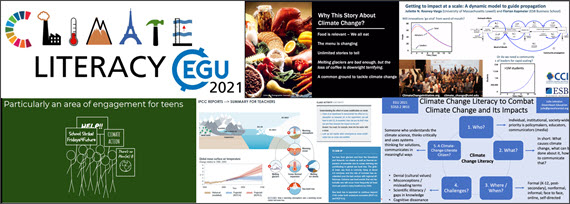
On Monday, April 26 the 2nd week of vEGU21 - the all virtual General Assembly of the Eurogeosciences Union (EGU) - started into the scientific programs which were all held in the vPico format. The initial week had seen a much more relaxed schedule with mostly Great Debates, Union Symposia and Short Courses on the agenda. So, this start of the 2nd week saw a much increased pace, activities and attendees all rushing into the many online sessions running in parallel. So it was little wonder that many vPICO-sessions experienced some technical issues and that the conference servers were taxed to the max and sometimes even crashed under the load or were not reachable for a few minutes.
To get an idea of how the sessions worked - or were supposed to work - I had joined the Geoethics session EOS4.2 which turned out to be one of those affected by these issues. The conveners Silvia Peppoloni and Giuseppe Di Capua did an amazing job to nonetheless get through all the presentations in the allocated time but unfortunately the text-chat break outs didn't come to pass. As other sessions had comparable issues, a decision was made by the organizers to switch from Big Blue Button to Zoom as the session tool and during a longer than planned lunch-break all afternoon sessions received a Zoom-ID and could get underway an hour later than originally planned. The EGU Today Newsletter for Tuesday, April 27 has some more information about the rocky start and recovery from that.
Clockwise from top left: Climate literacy logo designed by Robin Matthews; Using foods we love and need to enhance climate literacy by Michael Hoffmann; Getting to impact at scale by Juliette Rooney-Varga and Florian Kapmaier; Rising To The Challenge by Emer Emily Neenan; Resources for teachers on the “Ocean and Cryosphere in a Changing Climate” by Simon Klein et al.; Developing Climate Change Literacy to Combat Climate Change and Its Impacts by Julie Johnston
The session was convended by David Crookall, Giuseppe Di Capua, Lydie Lescarmontier, Robin Matthews and Frank Niepold and has been offered since 2018 because climate literacy is considered imperative and needs to be addressed massively and urgently, both within and beyond the EGU. The session usually sports a wide variety of presentations and this year's one wasn't an exception to that particular rule! After a few words from the session's conveners and the President of the EGU Division on Climate: Past, Present & Future Irka Hajdas, things got underway with the solicited presentation by Emer Emily Neenan which - given the morning's hassles - couldn't have been more aptly named than Rising To The Challenge: Addressing climate literacy in Ireland through the lens of student rights!
|
Rising To The Challenge: Addressing climate literacy in Ireland through the lens of student rights A recent geoscience education project, undertaken in Irish secondary schools using a children's rights based methodology that incorporated student voice in the design, implementation, and analysis, began with a focus on "Earth Science" but ended, through the influence of the student co-researchers, with a focus on climate literacy. Teenagers have seen the writing on the wall, as sea levels and global temperatures rise, and traditional career paths and global superpowers fall. Following on from the aforementioned project, an international comparative study currently ongoing seeks to establish global best practice in geoscience education and climate literacy, with the aim of facilitating improvement in the Irish context. Research suggests Irish school students are eager to learn about the Earth, but are frustrated by classes on climate change that are not actionable and do not address the systemic causes of the climate catastrophe. |
 |
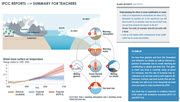 |
Resources for teachers on the “Ocean and Cryosphere in a Changing Climate” The essential role of education in addressing the causes and consequences of anthropogenic climate change is increasingly being recognised at an international level. The Office for Climate Education (OCE) develops educational resources and proposes professional development opportunities to support teachers, worldwide, to mainstream climate change education. Drawing upon the IPCC Special Report on the Ocean and Cryosphere in a Changing Climate, the OCE has produced a set of educational resources that cover the scientific and societal dimensions, at local and global levels, while developing students’ reasoning abilities and guiding them to take action (mitigation and/or adaptation) in their schools or communities. Find out more on the OCE website. |
|
Using the foods we love and need to enhance climate literacy Climate change is affecting the foods we love and need—just about everything on the menu is changing. Plants, the basis of life, require the right temperatures, water, soil, air, and sunlight. All but sunlight are changing and having subtle and in many cases ominous impacts on our foods and beverages—from spices and herbs to pistachios. The flavors of teas, the protein and mineral content of wheat, vitamins in rice, and yields of many crops are undergoing change. This story needs to be told given the cultural, historical, and personal connections everyone has to food. The communication and outreach approaches taken to enhance climate literacy include a book – Our Changing Menu: Climate Change and the Foods we Love and Need and this companion website.
|
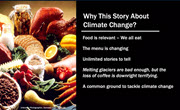 |
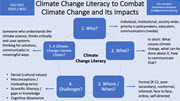 |
Developing Climate Change Literacy to Combat Climate Change and Its Impacts If literacy can be defined as competence or knowledge in a specific area, then climate change literacy is competence or knowledge in the area of climate change, its impacts, and its solutions. Climate change literacy is a vital element in strategies for meeting the United Nations Sustainable Development Goal (SDG) 13: "Take urgent action to combat climate change and its impacts" — and, frankly, safeguarding the survival of the human species and most life on Earth. Developing climate change literacy in individuals, institutions, and societies entails understanding why it is important, who must be involved, what it includes, where and when it takes place, how to deal with challenges that arise, and what the end result, a climate-change-literate citizen, will look like. Read the related paper on ResearchGate. |
|
Getting to impact at scale: A dynamic model to guide scaling of climate change education In order to successfully address climate change, society needs education that scales rapidly, transmits scientific information about its causes and effects, and motivates sustained commitment to the problem and science-based action to address it. The gap in public understanding and motivation to address climate change is not caused by a lack of information or educational resources that are effective. Systems thinking and simulation-based learning have been shown to deliver gains in knowledge, affect, and intent to take action and learn more about climate change. But, in order to have impact at scale, an educational innovation must be adopted at scale. Most of the time they are not: uptake from dissemination, active outreach, or word-of-mouth diffusion among educators usually falls short. Here, we describe and apply a simple system dynamics model to explore why propagation efforts often fall flat. We then use the model to explore how rapid scaling could be achieved in higher education. You can watch a 20 minute presentation here. |
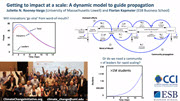 |
Towards the end of the session it was my turn to briefly introduce our MOOC Denial101x within two minutes and a one slide summary. The full presentation is available here (PDF, 7MB). If you ever need an elevator pitch to tell people about Denial101, here is the text I used:
And yes, that really fits within two minutes!
Abstract EGU-8576 - Using an interdisciplinary MOOC to teach climate science and science communication to a global classroom - full presentation (7MB)
After the official vEGU21 session, several conveners and abstract authors met "inofficially" on Discord where I got another chance to talk about the FLICC taxonomy in a bit more details and to introduce participants to Cranky Uncle. The PDF of the presentation is available for download here.
Thanks to everybody who participated!
Posted by BaerbelW on Wednesday, 28 April, 2021
 |
The Skeptical Science website by Skeptical Science is licensed under a Creative Commons Attribution 3.0 Unported License. |